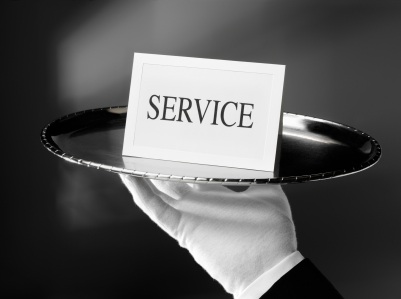Coyle Hospitality Group—a market leader providing mystery shopping programs, quality assurance consulting, and market research services exclusively to hospitality companies worldwide— explains how personalized service leads to loyal guests.
A car pulls up on the front drive. The valet opens the car door and the guest exits the vehicle. In that first instant, the valet captures the key to a trove of information: the guest’s name. As the guest approaches the front desk in pleasant conversation with the bellman who will be readily waiting with luggage to go to the room, the front desk agent is prepared because the valet has announced the guest’s arrival. “Mr. Jones, welcome back! We are so happy to have you here again.”
Isn’t that a little better than, “Checking in? Name? ID and credit card please.”
Hotels, unlike virtually every other business, require that potential customers provide a credit card, name, address, and even email address before the business is conducted. Once the transaction starts, guests redundantly provide the information again when a valet ticket is filled out and or when a driver’s license and credit card are provided at the front desk. Guests must do so much for just the promise of a hotel room, and if hotels recognize this and leverage it effectively, those guests will feel like they have arrived at, well, home.
Recognizing the Importance of Guest Loyalty
 We often hear: “It costs three to five times as much to attract new guests than it costs to retain existing ones.” According to Bill Dunn, Director of Business Development for Ipsos Loyalty, this is just a myth predicated on a current of unrelated factors. But whether this specific ratio holds true or not, we in the hospitality industry know that a loyal guest is far less costly than a new guest and can come along with an ROI that a new guest may not.
We often hear: “It costs three to five times as much to attract new guests than it costs to retain existing ones.” According to Bill Dunn, Director of Business Development for Ipsos Loyalty, this is just a myth predicated on a current of unrelated factors. But whether this specific ratio holds true or not, we in the hospitality industry know that a loyal guest is far less costly than a new guest and can come along with an ROI that a new guest may not.
First, loyal guests are less price sensitive than new guests because they understand company procedures and are familiar with the product, thus getting greater value from their relationship with the hotel company they frequent (Reichheld, 1996, p.49).
Second, loyal guests are more likely to inform management of service issues rather than simply swearing off a property. They like the hotel and want to ensure it stays the way they like it.
Finally, marketing efforts geared toward new guests are typically much more costly than those aimed at loyal ones, and loyal guests serve as free marketing tools via word-of-mouth.
This word-of-mouth piece is arguably the most important for two reasons. First, people trust suggestions made by friends and family–and, now, even by strangers on review websites and social media platforms–more than advertisements or other marketing tools because they are based on real experiences rather than fluff. Word-of-mouth recommendations have the ability to make intangible services concrete, and, for hotels, this opportunity is invaluable. Secondly, the fact is that many of your guests will simply never return, or they will return so infrequently that your share of their wallet is miniscule. Your hotel will go broke waiting for Mr. Jones to return when the reality is that he only travels to your market once every five years. In order to get any value from Mr. Jones, you need him to speak favorably to others or post positive comments on review sites for people to see. In order for that to happen, a surprise or delight will be needed.
Understanding Guest Loyalty vs. Guest Satisfaction
To understand the importance of guest loyalty, you must differentiate it from guest satisfaction. The level of guest satisfaction is based on the guest’s expectations of the service quality, the value of the service, and the quality actually received. High customer satisfaction leads to guest loyalty, and companies who experience higher guest loyalty perform better financially compared to their competitors (Kristiansen et al.,1992; Zeithaml et al.,1996; McColl-Kennedy and Schneider, 2000) because guest retention holds the promise of future revenue.
A highly satisfied guest becomes a loyal guest, and a loyal guest encourages new guests to visit a property. This is a great theory because it speaks to every society’s cultural norms. The problem is that the marketplace is competitive; hotels do not exist in vacuums. Any potential repeat business sourced from a satisfied guest will be challenged with attractive offers from competitors who are happy to provide some premiums for a crack at this new guest. Simple satisfaction is not always enough to induce loyalty, especially at the upscale and luxury level; instead, it is those memorable experiences–when a hotel goes above and beyond to completely indulge the guest–that create the yearn to return.

Personalizing the Experience
This longing to return is accomplished through meaningful, emotional, and personalized services. This is not simply about emitting a positive demeanor, making eye contact, smiling, or displaying an alert posture. To truly personalize a service, one must dig deep down to understand guest needs and wants before the guest knows them himself.
Here are the basics:
- Use the guest name: Using the guest’s name is one of the simplest, most effective ways to recognize a guest, and yet, it is one of the most commonly missed standards Coyle finds in hotel evaluations. Everyone likes hearing their name….Everyone.
- Ask caring, open-ended questions that cannot be answered with a dismissive yes or no: Ask the guest how their trip was, or how their stay is going thus far. The guest wants to feel valued, comfortable, and welcomed. This is a strong emotion, and it can only be achieved through proactive efforts. Our research shows that guests are proactively asked about their stay during mundane interactions (getting directions at the bellstand, getting a map at the front desk, requesting a wake-up call on the phone) less than 10% of the time. That is an opportunity to distinguish yourself if there ever was one.
- Anticipate guest needs: The good news is that your staff now practices the occasional open-ended question like, “How is your stay going so far.” If a guest mentions casually that he is feeling under the weather, has dinner reservations at 8, is tired, or can’t wait for the opera tonight, he has just told something very important about himself. Try role-playing these things at a staff meeting, and your service aces will come up with some amazing ways to anticipate needs and create a memory. It is inexpensive and easy to perform these acts, yet even the best hotels miss them frequently because we are a transactional species by nature.
- Perfect Service Recovery: What is the one thing we know about every guest? They all have the following in common: they aren’t home. This means that they are separated from their normal, trusted resource networks. They are vulnerable and know that if only a couple of things go wrong, their business trip or vacation is at peril. Talk about being emotional. This vulnerability means that there are times they are really going to need you. A smiling face and a little empathy starts the moment of truth off on the right foot. Again, not a sure thing for a guest approaching the desk who just realized tonight’s event is black-tie. What is a guest expecting from your front desk when they mention room service was late this morning? A standard apology will ring to a deaf ear which happens to be connected to a hand holding an $800 check-out folio. The opportunity that most hotels miss? They do not follow through and see that the remedy they prescribed did indeed work and that the guest was satisfied. Imagine having someone fix a problem and then check back to make sure everything was fine? That is a surprise and delight.
Coyle-referred professional hotel evaluators provide data that measure and analyze the elements of surprise and delight and provide valuable insights into the guest experience: both objectively and subjectively to get to the root of the emotional experience. If you would like to learn more about Coyle’s services, please continue reading about our evaluation programs, contact us online, or call us at 212-629-2083 ext. 106.













